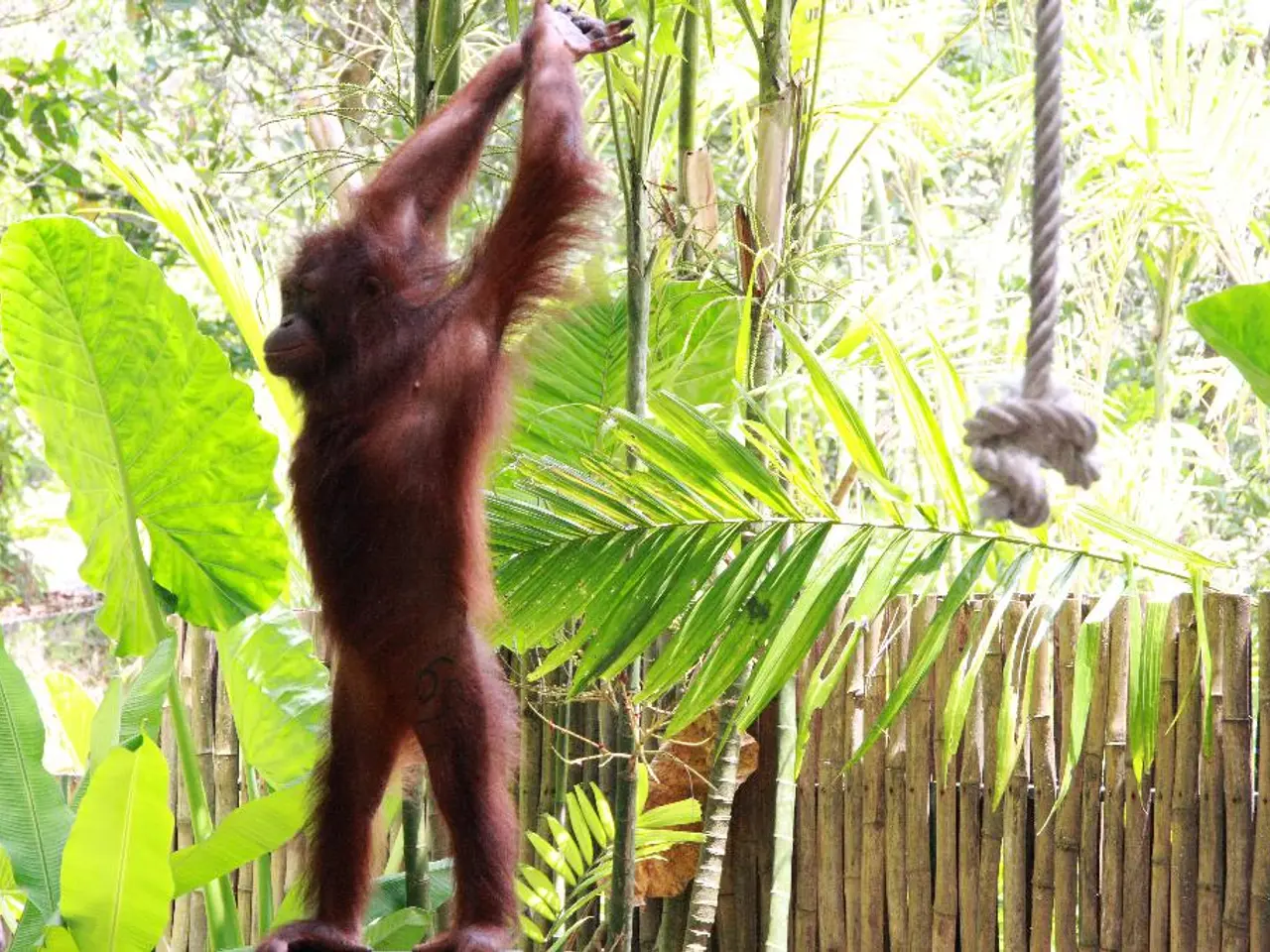Empower local communities for maximized protection of orangutans - Protected Primates: Orangutans Lead the Way
In the wild, orangutans call only Borneo and Sumatra their home, and they are classified as "critically endangered" by the World Conservation Union (IUCN). Unfortunately, conventional palm oil production, which accounts for more than 85% of the world's supply, is destroying vast rainforest areas, particularly in Indonesia and Malaysia, where the last orangutans reside.
However, every day choices can make a significant difference for these endangered great apes. Here are some ways to promote sustainability in your daily life:
Sustainable Palm Oil Consumption
- Choose Certified Sustainable Palm Oil (CSPO): Opt for products that use palm oil certified by organisations like the Roundtable on Sustainable Palm Oil (RSPO), despite controversies surrounding its effectiveness[3]. While not perfect, it is a step towards more responsible practices.
- Reduce Palm Oil Use: Lower your overall palm oil consumption by choosing products with alternative oils or avoiding processed foods that commonly contain palm oil.
- Support Eco-Friendly Brands: Back companies that prioritize environmental sustainability and transparency in their supply chains.
Sustainable Travel Decisions
- Support Local Conservation Efforts: Visit national parks and conservation areas in Malaysia and Indonesia that protect orangutan habitats. This supports local economies and conservation efforts.
- Choose Eco-Friendly Accommodations: Opt for hotels or lodges that have environmentally friendly practices and support local communities.
- Avoid Deforested Areas: Refrain from visiting areas known for deforestation or supporting activities that contribute to it.
- Support Local Communities: Engage with local communities involved in conservation efforts, as seen in Borneo, where community-led initiatives are crucial for orangutan protection[1].
- Learn About Local Environmental Issues: Stay informed about local environmental challenges, such as mining and logging, and support initiatives that counter these threats[5].
Additional Actions
- Raise Awareness: Educate friends and family about the impact of palm oil on orangutan habitats.
- Support Conservation Organizations: Donate to organisations like the World Wildlife Fund (WWF) or The Nature Conservancy, which work on conservation projects in Malaysia and Indonesia.
- Advocate for Policy Change: Encourage your government to implement stricter regulations on palm oil production and deforestation.
On August 19th, the world celebrates World Orangutan Day, a reminder of the urgent need to protect these incredible creatures. As Daniel Merdes, Germany director of the Borneo Orangutan Survival (BOS) Foundation, said, questioning individual consumption improves the quality of life. By adopting these practices, you can contribute to protecting orangutans and their habitats in Malaysia and Indonesia.
Every day, their jungle kingdom is being cleared for palm oil plantations, paper, and rare earths. Let's make a difference and ensure a future for these amazing animals.
- In supporting sustainable palm oil consumption, it's advisable to opt for Certified Sustainable Palm Oil (CSPO) products certified by the Roundtable on Sustainable Palm Oil (RSPO), as it encourages more responsible practices, despite opinions questioning its effectiveness.
- Lowering one's overall palm oil consumption can be achieved by choosing products with alternative oils or by avoiding processed foods that often contain palm oil.
- Encourage eco-friendly brands that prioritize environmental sustainability and transparency in their supply chains to support their efforts.
- Instead of visiting deforested areas or supporting activities contributing to deforestation, choose destinations known for their conservation efforts, such as national parks in Malaysia and Indonesia.
- Opt for eco-friendly accommodations that have environmentally friendly practices and support local communities during travel in Malaysia and Indonesia.
- In addition to these practices, spread awareness about the impact of palm oil on orangutan habitats among friends and family, and consider donating to organizations like the World Wildlife Fund (WWF) or The Nature Conservancy that work on conservation projects in these countries.
- On World Orangutan Day (August 19th), join in celebrating these incredible animals and remind yourself of the urgent need to protect them.
- As an active global citizen, advocate for policy change by encouraging governments to impose stricter regulations on palm oil production and deforestation, preventing further clearance of orangutan habitats and ensuring a better future for these amazing creatures.





